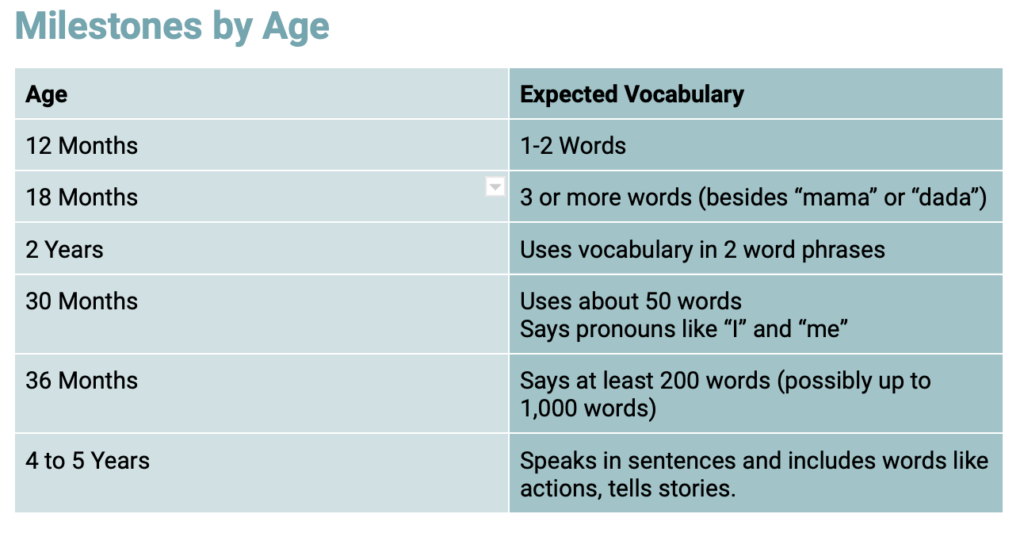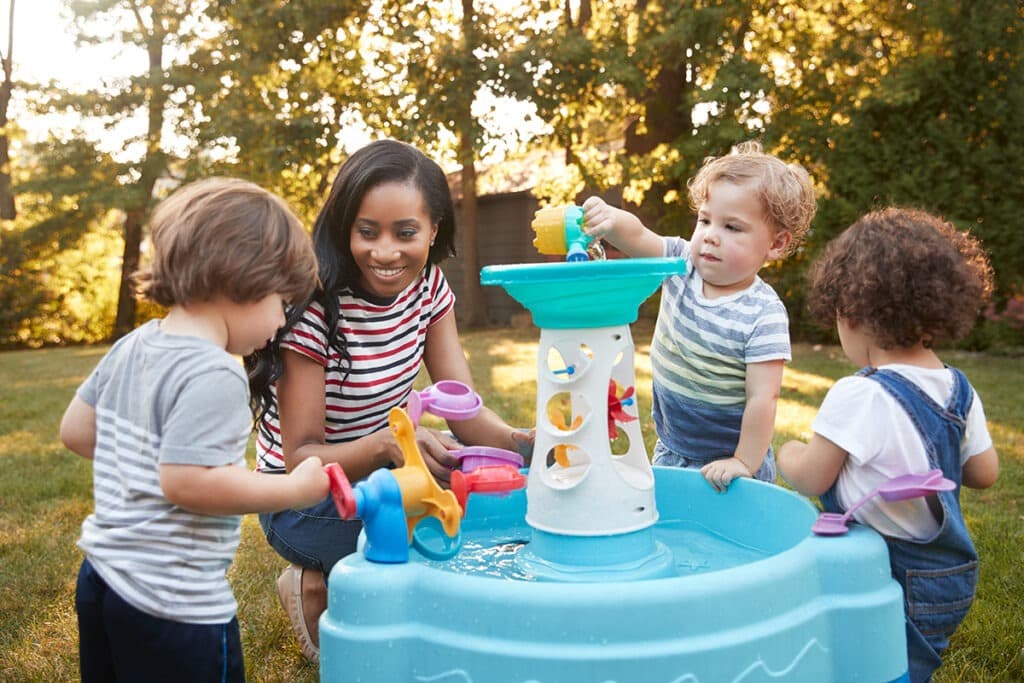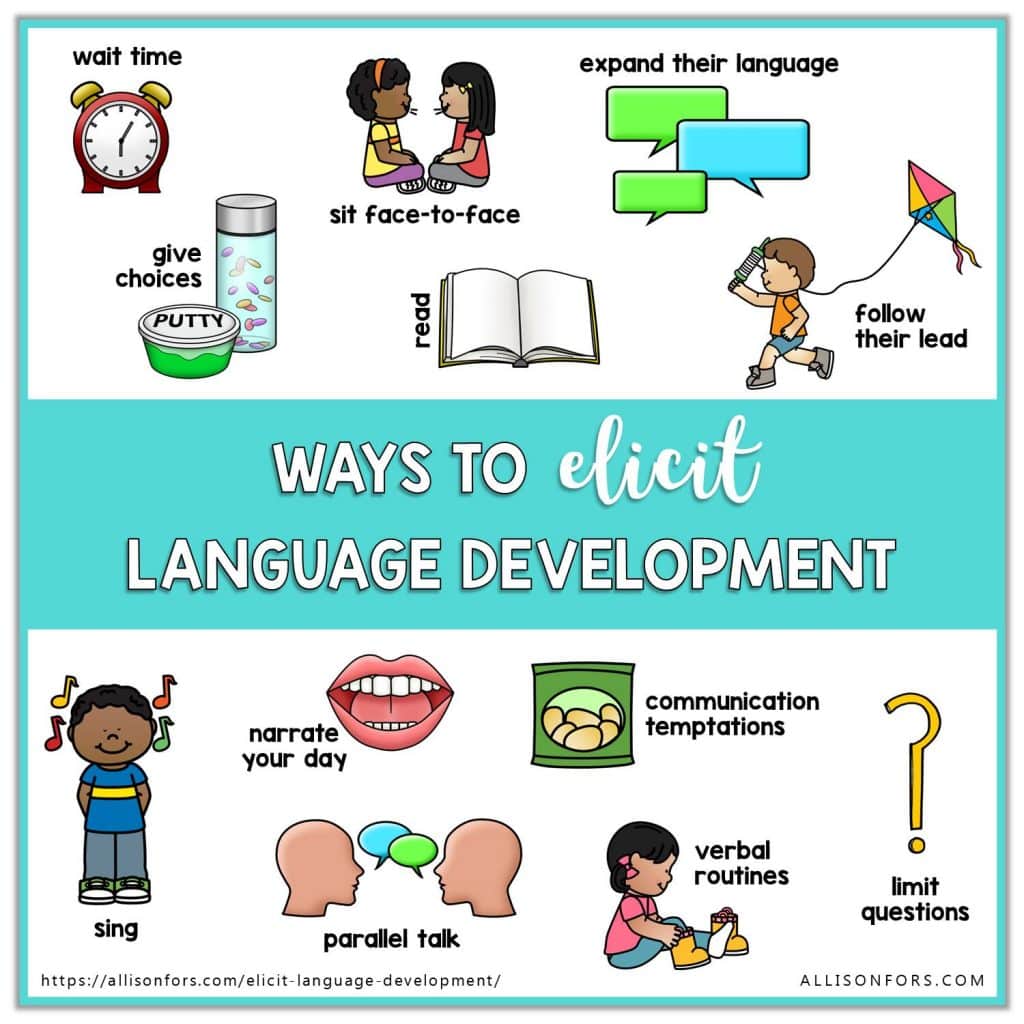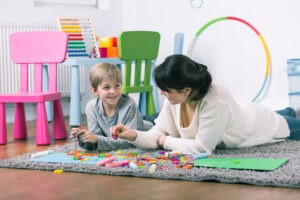But when should that first word come? And of course, we’re expecting them to continue adding more words to their vocabulary. But just how many, and at what ages?
Knowing those numbers can help you monitor your child’s language development so you can be sure he or she stays on track. That way, if you have concerns you can act early by seeing a Speech Therapist.
The vocabulary of infants and toddlers has been found to be a predictor of later vocabulary, literacy skills, and more.
How Vocabulary Develops
Vocabulary, by definition, refers to the words that we know. When children learn a word, the brain stores that word and a concept of its meaning.
In typical language development, a child understands many more words than he or she says. Your 1 year-old might be able to give you a ball when you ask for it, but might not say the word “ball” yet.
Receptive language includes the words your child understands. Expressive language refers to how your child communicates those words, either verbally or nonverbally.
When it comes to vocabulary, the more words your child understands and uses, the more he or she can continue to learn about the world around them. By the time your child reaches Kindergarten, vocabulary size can even predict their reading ability!
So, how does a child learn a new word? Usually, it’s by hearing the word in a meaningful context.
Seeing a picture or watching someone use gestures to show meaning as they hear a word helps store that word in his or her vocabulary.

Milestones taken from the CDC, Mayo Clinic , and ASHA
Strategies for Increasing Vocabulary
#1 Repeat, repeat, repeat
According to the Hanen Centre, a child needs to hear a word many times before he or she starts to use it.
Talk out loud about what you and your child are doing. Describe and point out things around you during daily activities. Hearing you name a “bird” as you point to in a book, then later in the sky while on a walk, can help reinforce your child’s understanding of the word’s meaning.
#2 Give Choices
Here’s a quick tip you can start using immediately. Try replacing “yes/no” questions you ask your child with giving them choices to increase their vocabulary.
Instead, give your child more choices. For example, “Do you want milk or juice?” or “Is that red or blue?” Not only can hearing the word while seeing it visually represents increase their understanding, it can also encourage your child to say a larger variety of words.
#3 Read books (and use context clues!)
Show your child how to use context clues; ways of looking at the other words in the sentence to figure out what a certain word means.
Then find other ways of working in those new words day-to-day to help your child remember them. For example, if he or she learned the word lucky in a book, later talk about how lucky they were when the rain held out until after the soccer game!
#4 Think Quality (not just quantity!)
Research shows that it’s not just the number of words a child hears, but which words he or she is exposed to that can influence their vocabulary.
- 12-12 months: Talk often to your child and give several examples of words.
- 24-36 months: Since many children have already learned common vocabulary, start using more advanced words like “difficult” instead of “hard”.
- 36-48 months: Tell stories and engage in conversation about past and future events. Give explanations for your child’s “why” questions.
#5 Tune Into Your Child’s Interests
Be careful not to bombard your child by talking too much during your interactions. Constant questions, testing on colors, labeling objects, etc. can take some of the fun out of playing with you for your child. Not to mention, it doesn’t always encourage them to say new words.
Remembering to wait can be so powerful!
Observe what your child is interested in, wait to see what he or she does, and listen for any sounds/words. Then build off of that!
For example, you observe your child pushing a toy car down a ramp. He smiles everytime it goes down. Get another car and take turns with him, saying “go!” each time.
Additional Resources
Vocabulary is one of the building blocks of language, and can even be considered the cognitive foundation of reading skills!
TherapyWorks offers speech therapy, occupational and physical therapy both in person (in Illinois, Michigan, and Ohio) and through teletherapy (nationwide). If you would like to learn more, or discuss your child’s specific needs, please don’t hesitate to reach out to TherapyWorks!









